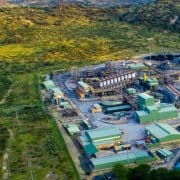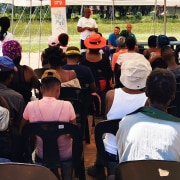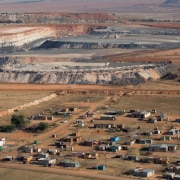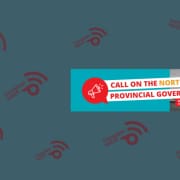|
Getting your Trinity Audio player ready...
|
By Mashudu Masutha
First published on Transparency International Australia
In the North West province, just north-west of Johannesburg, stretch lucrative chrome deposits.
There, a new chrome mine opened in March 2020 – right in the middle of South Africa’s hard lockdown restrictions to manage the Covid-19 pandemic.
This came as a surprise to the Balomiti community that lives in the area. The Balomiti community are private landowners and they own the land through a communal property association, a legal entity that enables the community to own land as a collective.
The community claims that they were never approached by any person or company regarding prospecting, therefore they were shocked when heavy machinery suddenly started destroying their land and interfering with their livestock.
The community members reported the matter to the Department of Mineral Resources and Energy (DMRE), however there has been no response. The community therefore reported this matter to Corruption Watch to request an intervention as operations continue while the DMRE remained silent. The community members allege that during attempts to engage with company representatives, they state that they have a mining licence and that discussions with the community regarding relocation will take place once the Covid-19 restrictions permit them to do so.
When Corruption Watch investigated the matter to verify the mining licence, we noted that mineral permits awarded during the pandemic period have not been properly recorded. It is therefore difficult to ascertain what has transpired. Further, all information requests to the department regarding the Balomiti community and the alleged award of the mineral license have also remained unanswered.
In the meantime, the company continues to operate on the private land despite reasonable and repeated attempts by the community requesting an urgent intervention from the department. The lack of transparency and information regarding the award of this mineral license places the community at a great disadvantage and limits the communities’ ability to exercise their land and participation rights. The community now feels it has to take the litigious route and seek a court order against the company to prohibit occupation and destruction of private property.
Covid’s impact on the risk of corruption
The concerning problem, over and above the lack of consultation, is the lack of transparency regarding the granting of mining rights during the pandemic.
Corruption Watch’s research long ago identified the opaque nature of the process of granting mining rights as a corruption risk, but we largely attributed this problem to capacity constraints within the DMRE, information asymmetries due to parallel approvals systems in electronic and hard copy processes, etc.
Now, it appears the Covid-19 pandemic and the re-prioritisation of certain sectors has led to the government fast-tracking mining licence and renewal applications to manage the backlog of applications across the country. The government justifies by saying that it promotes economic activity and jobs.
As we saw in the Balomiti community, due to lockdown restrictions community consultation processes have been side-lined, and objection meetings and appeals processes have not taken place at appropriate times. Corruption Watch has received reports of a large number of appeals being dismissed as ‘frivolous’ during the lockdown period and mining permits and renewals being subsequently granted.
The reduction in transparency and the neglect of community engagement increases the risk of corruption. Specifically, it increases the risk that mining rights will be awarded for private or personal gain rather than the public’s best interest. This is further illustrated by the allegations that have been levelled against the regional managers within the DMRE – allegations they accepted bribes in exchange for approving mining licences.
The consequences for communities are significant. The relaxation of licensing regulations exposed the Balomiti community to full-scale mining operations without meaningful engagement or consultation. Further, due to the lack of transparency with regard to how and what policy was followed during the pandemic in terms of the approvals process, communities have had to turn to the courts as the only accountability mechanism available to them. While it’s good and important that people have access to the court system as a means to hold government decisions to account, it is a difficult, expensive and time-consuming process, especially for communities with few resources.
Taking action
Corruption Watch is helping the Balomiti community with their legal action. We continue to investigate the allegations made by the community, and are trying to ascertain whether a license was awarded to the operating company. This finding will be crucial to the community’s litigation, as they are seeking to prohibit occupation and destruction of their private property. We have also offered further legal support to help them engage with the department and raise their formal objections to the company’s operations.
Most importantly, we want the release of the department’s investigative report on the corruption allegations levelled against the regional managers in the DMRE accused of accepting bribes in exchange for mineral licenses and permits.
More broadly, we want to raise awareness about the changes in licensing policy that have come about in response to the pandemic, and have teamed up with other civil society organisations for research and investigative support.
At Corruption Watch we are working to provide important oversight over the process of approving mining rights during the pandemic. We are investigating and fixing the loopholes that enable corruption to thrive in a sector as big, powerful and impactful as mining. That means ensuring mining licences are transparent, awarded fairly, with conditions that ensure mines operate safely, and people have the opportunity to hold decision-makers to account.
Covid-19 has taken a huge toll on people’s lives, people’s health and people’s well-being. The government’s response to managing this crisis must not risk doing further harm. As Transparency International’s global research and our many counterparts have said – corruption thrives in times of crisis.








